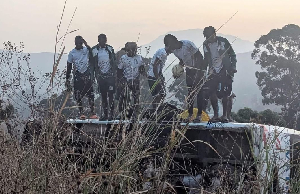Leaders of Nigeria and Cameroon have signed a series of agreements as they seek to put old disputes aside. Both nations are currently fighting Boko Haram Islamists.
In what appears to be an attempt to restart what were previously cold relations, Nigeria and Cameroon on Wednesday (04.05.16) signed a number of deals aimed at strengthening the security and economy of the Lake Chad Basin nations.
Abuja and Yaounde have long had a dispute over the ownership of the oil-rich Bakassi Peninsula which brought the two nations to the brink of war in 1981. The matter was resolved in 2002 by a decision from the International Court of Justice which handed over possession to Cameroon.
Currently, Nigeria and Cameroon find themselves united against the threat of terrorism. This is one of the main reasons that prompted a two-day visit by Cameroonian President Paul Biya to Abuja.
Tackling Boko Haram
The visit, the first of its kind in over two decades and a half, mostly focused on the Boko Haram insurgency as well as economic cooperation. Biya's last official state visit to Nigeria was in 1991.
Several agreements on military cooperation and trade were signed by the two leaders. Amongst them is the shared resolve to defeat Boko Haram completely.
"In as much as the security issues are important and we should focus on them, we also understood the need to focus on the economic issues," Biya said at the end of his visit. He said it was important to re-establish the livelihood and revamp the local economies in areas affected by the Boko Haram insurgency.
"We also touched on climate change and its consequences on our region and Africa in general," Biya added.
Military commended
Nigerian President Muhammadu Buhari applauded the contribution by Cameroon and other Lake Chad Basin Commission countries in the fight against Boko Haram.
"On the security aspect, I remain grateful to the Lake Chad Basin Commission, because on my arrival we found some of the efforts made and we have built on it," Buhari said.
The Nigerian leader also mentioned the role played by the Multinational Joint Task Force (MNTJF). The MNTJF was formed as a result of the need by Lake Chad Basin Commission member countries to jointly tackle insecurity, particularly the threat of terrorism. The headquarters of the task joint force is in Chad's capital N'Djamena.
The MNJTF was formed as a result of the need by the LCBC member countries to pool their effort together in a bid to provide a common and coordinated solution to the security challenges in the Lake Chad Basin region, especially the security challenges posed by terrorists in the region and beyond
Read more: https://www.naij.com/452572-nigerian-general-to-head-multi-national-joint-task-force.html
The MNJTF was formed as a result of the need by the LCBC member countries to pool their effort together in a bid to provide a common and coordinated solution to the security challenges in the Lake Chad Basin region, especially the security challenges posed by terrorists in the region and beyond
Read more: https://www.naij.com/452572-nigerian-general-to-head-multi-national-joint-task-force.html
The MNJTF was formed as a result of the need by the LCBC member countries to pool their effort together in a bid to provide a common and coordinated solution to the security challenges in the Lake Chad Basin region, especially the security challenges posed by terrorists in the region and beyond
Read more: https://www.naij.com/452572-nigerian-general-to-head-multi-national-joint-task-force.html
"We have said enough about the performance of both our militaries. We thank you and we thank other members of the Multinational Joint Task Force for occasionally coming in to our own country and securing it for us from Boko Haram terrorists," Buhari said.
Apart from the task of securing their borders, Cameroon and Nigeria also agreed to resume the demarcation of the nearly 1,500 kilometer (932 mile) long contested border.
Actualités of Thursday, 5 May 2016
Source: dw.com













